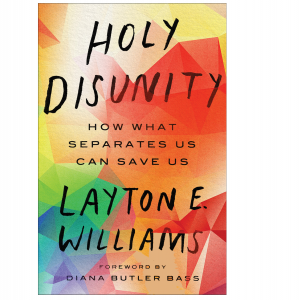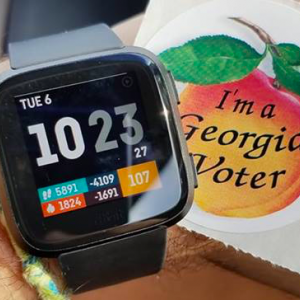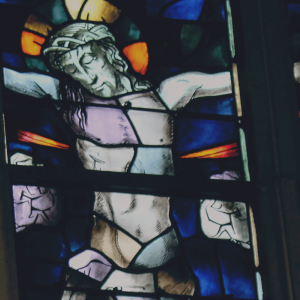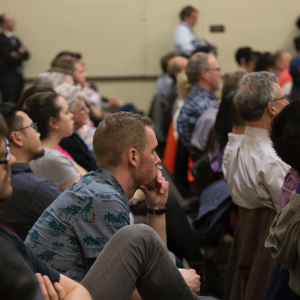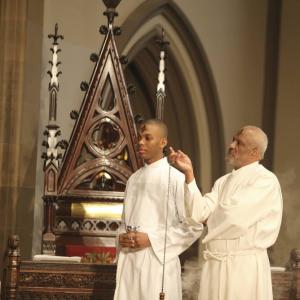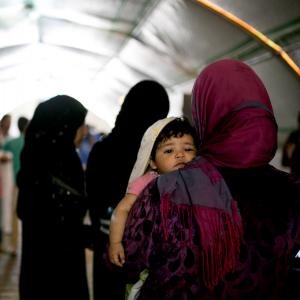
Layton Williams is the the author of Holy Disunity: How What Separates Us Can Save Us (WJK Press, Oct. 2019). She is a writer, focusing on intersections of faith, justice, politics, and culture with an emphasis on sexuality and gender. In addition to Sojourners, her work has been published by Religion Dispatches, Believe Out Loud, Reconciling Ministries Network, and Presbyterians Today, among others.
Layton previously served on the Sojourners staff. Before that, she served as the Pastoral Resident at Fourth Presbyterian Church in downtown Chicago. She grew up in Atlanta, then lived in Austin, Texas, for six years where she served as an AmeriCorps volunteer and nonprofit educator prior to attending seminary. She holds a B.A. in English from the University of Georgia and an M.Div from Austin Presbyterian Theological Seminary. She was ordained as a minister in the Presbyterian Church (USA) in 2014.
Beyond the realms of faith, justice, and writing, Layton’s interests include improv, pop culture trivia, travel, and discovering new passions. Find her on Twitter at @LaytonEWilliams.
Posts By This Author
Disunity Has the Power to Save Us
DISUNITY IS SO often seen as an evil: the breakdown of relationship, of community, of cohesion. But disunity doesn’t have to mean destruction. In the arguments and protests born from our disunified state, we hear hard but important truths that push back on our assumptions and our hubris. In our willingness to confront our own doubts, and others’, about things we’ve always assumed to be true, we are invited to discover new and deeper understandings of truth. In disunity, our differences and limitations and failures clash against one another, sometimes violently, but those clashes can also be an invitation for us to be stretched and expanded—or at least to understand that the world and humanity are more expansive than any one of us. Our hunger can turn us into enemies, seeking to deprive one another so that we ourselves might have enough. But our hunger also reminds us that we need more than ourselves; we are not sufficient alone. And even when our disunity puts us utterly and irrevocably at odds, when it demands that we be separate, that gulf between us offers space for each of us to grow—perhaps even toward each other.
One Vote, an Entire Community Steps In to Make Sure It Counts
"My faith informs my agency in the world and we are called to use whatever resources are at our disposable," Shields told Sojourners. "Luke 11: 5-13 is a story of persistence. And when I se injustice in our system or at the least, morally gray positions held by people in power, that is a call to act in the world. As a Christian, Christ calls us to the ministry of reconciliation, and that include the process of voting."
3 Tips for Churches Celebrating Mother’s Day

Image via Unsplash/ScouttheCity
If we commit ourselves, as Christians and communities of faith, to see one another in our full complex experiences of life, if we name and honor and celebrate and walk with one another in each of life’s many layers day after day and week after week, then Mother’s Day will still come each year, as it always does. And it will no doubt, still carry both joy and pain for people. But perhaps it will not be so much an overwhelming challenge to us, to cram a universe worth of feeling and experience that we otherwise neglect into a single day.
#WomenCrushWednesday: Marjory Stoneman Douglas, Activist and Namesake to a Movement
Marjory Stoneman Douglas set an astonishing example over the course of her life of the power that one dedicated voice can have. With her words and her actions, she fought for a better world for women, for people of color, for those living in poverty, and for the earth itself. We all — not just Floridians — inhabit a world made better by her.
Out of the Ashes
ABOVE A 2002 article in The Irish News headlined “Priests present cheque to minister” is a photograph of a collared clergywoman surrounded by four Catholic priests. They stand shoulder to shoulder, all smiling, looking toward something ahead of them. Dominating the background is the burned-out shell of a church.
The backdrop of this image—destruction and religion—exemplifies Northern Ireland to much of the world. But the foreground, Catholic and Protestant clergy standing together, smiling toward an unknown future, might just represent what Northern Ireland—in spite of and because of its divisive and violent history—has to teach the U.S. and other countries who find themselves caught in a divisive and violent present.
During the predawn hours of Aug. 2, 2002, Whitehouse Presbyterian Church, on the north side of Belfast, went up in flames. The fire was first spotted by a Catholic taxi driver who lived across the street—he was up late that evening. He called the fire department, but there wasn’t much that could be done. By morning, as the bleary-eyed pastor and congregants of Whitehouse arrived, the building had burned to the ground.
Eventually, the fire was ruled arson—the third attempt in the year and a half that Rev. Liz Hughes had served as minister at Whitehouse, acts of destruction born of the ongoing conflict between Protestants and Catholics throughout Northern Ireland. By 2002, it had already been four years since the Good Friday accords were signed and peace was officially declared in the small, British-ruled country, but action had not entirely caught up to policy.
The Faithful Witness of Edie Windsor
Edith Windsor died at the age of 88 this week. Her legacy in bending the arc ever more toward justice — nationwide and indeed within the faith community — cannot be overstated.
In 2013, Edie won her Supreme Court case in a landmark victory for LGBTQ rights in the United States. I was newly out, trying to become a minister in a denomination that had just begun allowing the ordination of LGBTQ people. Even as my church still struggled to be fully inclusive toward LGBTQ people, many of us saw hope and possibility in stories like Edie’s. That hope kept us faithful — both to God and to our own queer identities.
10 Bible Passages That Teach a Christian Perspective on Homosexuality
The long history between the church and LGBTQ people is one fraught with tension, pain, and, sometimes, violence. Those who believe that homosexuality is a sin often point to several well-known Scripture passages from the Old and New Testaments. Most of the Christian debate about human sexuality has centered on interpretation and emphasis of these passages.
In his book God and the Gay Christian , Christian LGBTQ activist Matthew Vines challenges LGBTQ-condemning interpretations of these Scriptures — sometimes referred to as “clobber passages.” But these clobber-texts aren’t the only Scriptures that can guide faithful Christians as we seek a godly understanding of sexual and gender identity.
Margaret Atwood on Christianity, ‘The Handmaid’s Tale,’ and What Faithful Activism Looks Like Today
Williams: ... You alluded earlier to how groups purporting to be Christian, like in your novel, are not really a legitimate representation of Christianity. I'm wondering if you could say a bit more about how you believe faith can also be a force for good? And whether it can serve as a primary vehicle for justice?
Atwood: No question. I mean, early Christianity was egalitarian. And it was also very courageous because it underwent various persecutions, as you know, and so it also had its own underground. … Of course faith can be a force for good and often has been. So faith is a force for good particularly when people are feeling beleaguered and in need of hope. So you can have bad iterations and you can also have the iteration in which people have got too much power and then start abusing it. But that is human behavior, so you can't lay it down to religion.
Obedience Does Not Mean Submission to Violent Power
Submissive obedience is deeply embedded in Christian theology. The origin of sin is attributed to Adam and Eve’s disobedience in the garden. Jesus, by contrast, is described as “obedient unto death” — an example we are taught to emulate. God is depicted as all-powerful, all-knowing, a king and lord and father with relentless control over all things. And we — broken, limited, and prone to mistakes — are meant to trust God in all things, and give ourselves over completely to God’s divine power. This call to submissive obedience is exemplified, more clearly than anywhere else, in Jesus’ willing submission to torture and death on the cross.
Good Friday is an invitation for us, every year, to ask: What is actually good about Jesus’ death on the cross? What about it is salvific, and what is it saving us from?
Princeton Seminary President Talks Tim Keller, Women’s Ordination, and How One Award Ignited Christian Twitter
Yesterday, we spoke with Princeton Seminary president Dr. M. Craig Barnes about the controversial decision to rescind the award — which he revealed to us was actually Keller’s suggestion — and his hopes for the school moving forward.
Four Transgender Women Were Killed Last Week in the U.S.
The Southern Poverty Law Center reports that these latest crimes bring the total number of trans women murdered in 2017 to seven. That is a higher number than at this point in 2016, a year that saw trans deaths on the rise: Twenty-seven transgender people were reported murdered in 2016, more than any previous year.
How Overworked Clergy Culture Undermines A Healthy Theology Of Sacrifice
We are steeped in a culture that celebrates endless work and the denial of one’s own health. Christian faith leadership demands a counter-witness. Ministry life should reflect a theology of service and commitment both to God and other people, but it should also embody healthy balance and spiritual sustainability for the long work of learning faith and reflecting God’s grace to a world hungry for it.
Where Is Your Jesus When You Ban Refugees?
I want to ask: Where is Jesus when you call for a ban and a wall? But the answer is clear. Jesus is with them: the ones we’ve turned away, the ones we allow to suffer out of fear and hate. Jesus is holding the hand of the scared child being detained in an airport backroom. Jesus is breaking bread with our neighbors on the far side of the wall and our siblings seeking refuge across the world. And Jesus is saying to us, “come and follow me.”
What Does the Women's March Mean for the Future of Feminism?
This weekend, hundreds of thousands will flood the streets of Washington, D.C., to take part in the Women’s March on Washington, a massive rally that organizers describe as an opportunity to “stand together in solidarity with our partners and children for the protection of our rights, our safety, our health, and our families — recognizing that our vibrant and diverse communities are the strength of our country.”
The march calls for unity, and indeed, such a public event has the power to shape and energize the future of feminism, at least in the months ahead. But many are asking who that future will serve, and who might be left behind.
Thanks, Obama

Image via U.S. Embassy, Jakarta/Flickr
From President Obama, I have learned to be an activist, to fight for change, and to believe that change is possible even on the darkest days. I have learned to cry out against injustice and name the evils in this world for what they are, to speak bold truth about what I believe is right even when it feels dangerous.
3 Things 'Rogue One' Can Teach Us About Resistance in 2017
Rogue One meets us where we are. In a divisive time, when prejudice reigns with renewed power and threatens a destructive future, and where unquestionably moral leaders can be hard to come by, those of us seeking to faithfully resist injustice would do well to look to Rogue One for what it has to teach us
What 'Momastery' Blogger Glennon and Abby Wambach's Love Means to Me

Screenshot via YouTube/TEDxTraverseCity
Last night, scrolling through my Facebook feed, a firecracker of joy exploded across my emotional landscape, briefly pulling me away from the fear, anger, and grief I’ve felt since the presidential election. A queer female friend had shared a post: Christian writer and blogger Glennon Doyle Melton had announced her new relationship with U.S. soccer star Abby Wambach.
Over My Dead Body

Image via Chaikom/Shutterstock.com
Trump has painted a picture of America where walls loom, refugees are banished without a merciful glance, families are torn apart, people of color are killed more frequently and with even less consequence, and the suffering are left to suffer all alone. I find myself praying for a presidency that is only bad rather than catastrophic. And I find myself resolved with a new certainty to never let the vision Trump has painted come true.
Standing Rock Check-Ins and the Value of Virtual Activism
Sometime over the weekend, I noticed a few friends unexpectedly “check-in” to Standing Rock Sioux Reservation, N.D., on Facebook. Given the recent rise in tensions between police and the water protectors protesting the Dakota Access Pipeline, it made sense to me that some of my pastor-friends would go be a part of the protests.
60 Years After Women's Ordination, an Ongoing Fight to Be Taken Seriously

Image via dourleak/Shutterstock.com
Still, it’s rarely easy being a woman and a minister. We lean on one another, finding community in person and online in dedicated groups such as The Young Clergy Women Project and Rev Gal Blog Pals. And, occasionally, we rely on the cathartic release of a snarky internet meme, shared among fellow “Reverend Nasty Women.”
We keep at it, decade after decade, because God continues to call us to bring our stories, our gifts, and our whole selves to serve the church. And if progress is slow, it is nevertheless making a difference.
